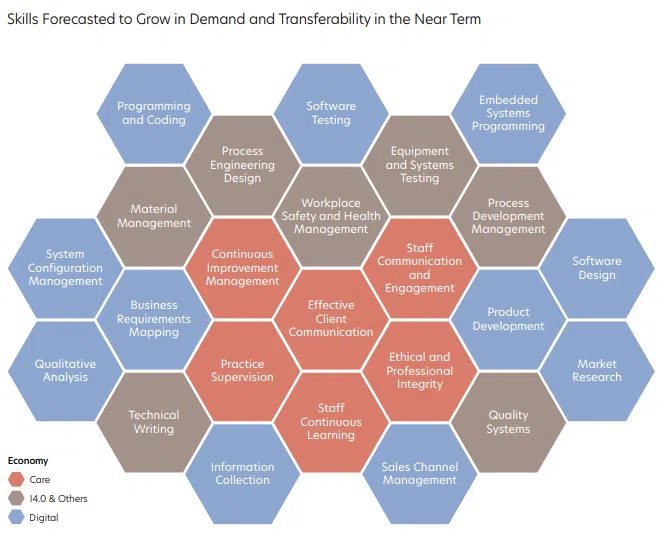🧘 How are you investing in yourself this year?

Straight to your inbox. Money, career and life hacks to help young adults stay ahead.
- Find out more and sign up for thrive at bt.sg/thrive
🤹 Learning a new skill
The reality of today’s job market is that a diploma or degree doesn’t guarantee stable employment.
Case in point: Only 54.6 per cent of fresh polytechnic graduates in 2024 found full-time, permanent employment within six months of getting their diploma, latest results of the Graduate Employment Survey showed this week. The rest were either freelancing, in part-time or temporary employment, or unemployed.
Picking up a new skill is one of the best ways to invest in yourself that’ll make the biggest impact on your career (and salary).
Theoretically, it goes like this: You learn a new technical skill → you add that new skill to your CV → that new skill opens up more work opportunities or allows you to be better at your job and advance faster → profit.
While we all know the importance of upskilling to stay relevant, what isn’t so straightforward is knowing what courses to sign up for.
For those unsure where to begin, the government’s SkillsFuture portal is a great free resource. For the past few years, it has released an annual report highlighting the top job skills that are in demand or expected to grow in demand.

While many of the skills listed here are hard skills, it doesn’t mean that soft skills aren’t important too.
One in two hiring professionals here say that they’re facing challenges finding candidates with the right soft skills for the role, according to a recent LinkedIn survey.
But soft skills such as communication, leadership and emotional intelligence are something many people learn at the job. So how can fresh graduates, with no work experience, pick up these skills?
Feon Ang, managing director of LinkedIn Asia Pacific, suggests participating in projects and clubs in school or in community organisations, internships, or volunteer work. “For instance, running an event for a school club demonstrates project management, teamwork and interpersonal skills,” she tells thrive.
And contrary to popular belief, soft skills can also be learned systematically through structured courses or workshops, such as ones found on LinkedIn, says Ang.
Some popular ones she recommends:
- Problem solving
- Communication foundations
- Developing emotional intelligence
- Learning how to develop an agile mindset
☕ Getting yourself out there
Attending courses isn’t the only way to invest in yourself. The reality of the workplace is that you can be the most skilful employee, but when you’re out of sight, you’re out of mind when it comes to work appraisals.
Invest the time to get to know your colleagues or attend work events, especially now that most companies have reinstated some form of return-to-office policies. If there’s a senior that you respect at your workplace, you might want to ask that person to be your mentor.
Something I learnt from a former colleague of mine is that bosses tend to have more favourable impressions of employees who work on side projects than those who excel in their routine work assignments. So if time permits, consider volunteering to work with other teams on cross-functional projects that can get your name out there.
Be active outside your company too by attending industry and professional events to build new contacts that can open doors to new job opportunities.
Think of networking as a form of investment. When you meet new people, there’s no guarantee that you’ll immediately be able to land a new job or get something in return. But over time as you grow your network, you’ll thank yourself for having built some level of relationship with a contact, especially when you need something from that person.
🧹 Getting your finances in order
Maybe your credit card slashed its rewards but you couldn’t be bothered to switch to a better card. Or you’ve put off investing your year-end bonus and it’s sitting idle in your bank. If you’ve been putting off managing your finances, it’s a good time now to do something about it.
That in itself can be a form of investing in yourself. If you want to go a bit further, pick up some books or online resources about personal finance and investing. (Ahem, like subscribing to this newsletter 🙂.)
🧘 Looking after yourself
Investing in yourself is about actively working towards your personal growth and well-being, but it doesn’t have to be limited to things that will have a direct impact on your career or wallet.
Sometimes, small steps and new habits in your personal life can have the biggest difference in making the day-to-day that bit more fulfilling.
Prioritise your mental health and learn what it means to practise self-care. Take care of your health and exercise regularly. Pick up a hobby you enjoy that makes you feel good about yourself, or make it a goal to break a bad habit.
Yes, investing in yourself requires commitment and dedication (and maybe some money). But it’s also a form of self-respect – that you have the potential to be a better version of yourself than you are today. And chances are, you won’t regret it.

TL;DR
- In this challenging job market, picking up new skills is one of the most direct ways further your career
- Consider making yourself more visible in the workplace and growing your contacts
- Take the time to get your finances in order and learn good money habits
- More importantly, invest the time and energy to take care of yourself
Decoding Asia newsletter: your guide to navigating Asia in a new global order. Sign up here to get Decoding Asia newsletter. Delivered to your inbox. Free.
Copyright SPH Media. All rights reserved.

